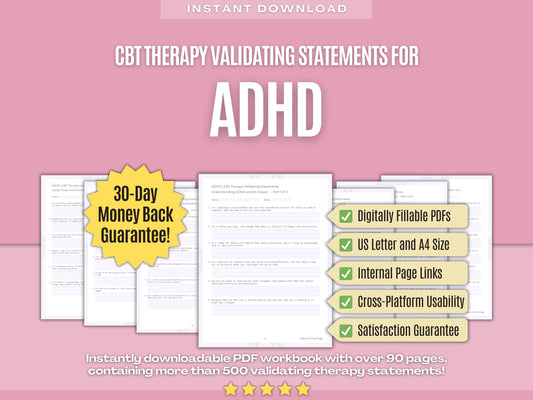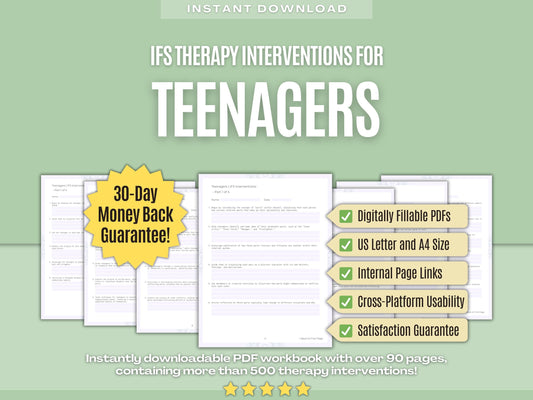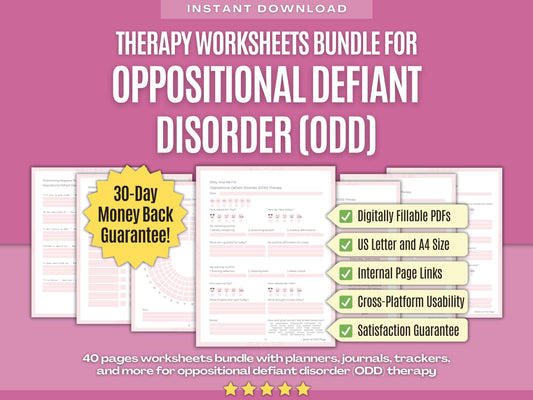Elevate Your Therapy and Guide Your Clients to Inner Healing with Our Bipolar Disorder Validating Therapy Statements! ✨
1. Beginning Bipolar Therapy
- Starting therapy for bipolar disorder is a significant step towards taking control of your mental health.
- It's understandable to feel a range of emotions as we begin this journey together.
- Your feelings and experiences are valid, and I'm here to support you through them.
- We'll work together to understand your unique experiences with bipolar disorder and how they impact your life.
- It's okay to have mixed feelings about starting therapy, and we'll navigate through them together.
- We'll collaborate to set realistic goals that align with your aspirations for managing bipolar disorder.
- Your experiences with bipolar disorder are unique, and we'll work together to develop personalized coping strategies.
- Your self-awareness about your triggers and warning signs is valuable, and we'll incorporate them into our therapy.
- Your journey towards healing is valid, and I'm honored to be a part of it.
- It's okay to take things one step at a time as we begin this therapeutic process.
- I'm here to listen to your concerns and provide support without judgment.
2. Bipolar Disorder Education
- Education about bipolar disorder is essential for understanding the condition and managing its symptoms effectively.
- It's common to have questions and uncertainties about bipolar disorder, and we'll address them together.
- Learning about the different types of bipolar disorder, such as Bipolar I, Bipolar II, and Cyclothymic Disorder, can provide insight into your experiences.
- Recognizing the early warning signs and triggers of mood episodes is crucial for proactive management.
- Understanding the neurobiological changes associated with bipolar disorder can help destigmatize the condition.
- Learning about the various treatment options, including medication, therapy, lifestyle changes, and self-care strategies, empowers you to make informed decisions about your care.
- Exploring the role of therapy, such as cognitive-behavioral therapy (CBT), interpersonal and social rhythm therapy (IPSRT), and family-focused therapy (FFT), can provide additional support in managing bipolar disorder.
- Learning about the potential risks of untreated bipolar disorder underscores the importance of seeking timely support and treatment.
- Understanding the impact of bipolar disorder on relationships, work, and daily functioning can help mitigate its effects and foster resilience.
- We'll discuss the importance of building a strong support network and reaching out for help when needed.
- Understanding the potential impact of comorbid conditions, such as anxiety disorders or substance use disorders, can inform comprehensive treatment approaches.
3. Mindfulness for Bipolar Stability
- Incorporating mindfulness practices into your daily routine can be a powerful tool for promoting stability and well-being in managing bipolar disorder.
- Mindfulness invites us to cultivate awareness of our thoughts, emotions, and bodily sensations without judgment or attachment.
- Practicing mindfulness can enhance your ability to recognize and respond to early warning signs of mood fluctuations.
- Mindfulness encourages us to anchor our awareness in the present moment, fostering a sense of grounding and stability.
- Cultivating a nonjudgmental attitude towards your experiences allows for greater acceptance and self-compassion in managing bipolar disorder.
- We'll integrate mindfulness into your daily routine, exploring ways to incorporate brief moments of mindfulness amidst your activities.
- Mindfulness encourages a gentle curiosity towards our internal experiences, fostering a sense of openness and flexibility.
- Mindfulness practices can enhance your resilience in the face of stressors, helping you navigate through challenges with greater clarity and composure.
- We'll explore how mindfulness can support your overall well-being, including improved sleep quality, stress reduction, and enhanced self-awareness.
- Incorporating mindfulness into your self-care routine can foster a sense of empowerment and agency in managing your bipolar disorder.
- We'll explore how mindfulness can enhance your interpersonal relationships by promoting empathy, active listening, and emotional regulation.
4. Dialectical Behavior Therapy (DBT) for Emotional Balance
- Engaging in dialectical behavior therapy (DBT) for emotional balance demonstrates your commitment to developing effective coping skills for managing bipolar disorder.
- DBT offers a comprehensive framework for regulating emotions, improving interpersonal relationships, and building resilience.
- By learning to observe and describe your emotions nonjudgmentally, you can develop greater self-awareness and acceptance.
- DBT emphasizes the importance of distress tolerance skills to help you navigate through difficult emotions without resorting to impulsive or harmful behaviors.
- We'll work on identifying and challenging black-and-white thinking patterns that contribute to emotional distress and rigidity.
- We'll explore how self-soothing techniques, such as self-care activities or sensory experiences, can provide comfort and relief during times of distress.
- DBT encourages a compassionate approach towards yourself and others, fostering empathy and understanding.
- Practicing radical acceptance allows you to acknowledge and make peace with difficult emotions or situations, reducing inner turmoil.
- DBT skills are designed to be practical and applicable in everyday life, providing you with tools to navigate through various challenges.
- Engaging in meaningful activities and relationships can provide a sense of purpose and fulfillment, contributing to emotional stability.
- Remember, progress in DBT is a journey, and each step forward, no matter how small, is a testament to your resilience and growth.
5. Interpersonal Therapy (IPT) for Relationship Management
- Engaging in interpersonal therapy (IPT) for relationship management reflects your commitment to improving the quality of your relationships while managing bipolar disorder.
- IPT offers a structured approach to addressing interpersonal difficulties and enhancing communication skills to promote healthier relationships.
- By exploring the connections between your mood and your interactions with others, you can gain insight into how relationships impact your mental health.
- Learning effective communication skills can help you express your needs and boundaries assertively, reducing misunderstandings and conflicts.
- IPT emphasizes the importance of addressing interpersonal role disputes or conflicts that may arise from differing expectations or values.
- We'll explore how transitions or life changes, such as job loss, relocation, or relationship transitions, may impact your interpersonal functioning and mood stability.
- We'll work on enhancing social support networks by identifying sources of support and fostering meaningful connections with others.
- IPT encourages you to explore how changes in social roles or expectations may affect your sense of identity and self-worth.
- By recognizing and addressing interpersonal stressors, you can reduce the risk of mood episodes and promote greater stability in managing bipolar disorder.
- Practicing empathy and active listening skills can enhance your ability to understand and validate the experiences of others, fostering deeper connections.
- I'm here to support and guide you as you explore IPT principles for relationship management in bipolar disorder, offering validation and encouragement along the way.
6. Emotion-Focused Therapy (EFT) for Mood Understanding
- It sounds like you're experiencing a whirlwind of emotions right now, and that's completely valid.
- I can see that you're struggling, and it takes courage to confront those difficult emotions.
- Your emotions are a natural response to the challenges you're facing.
- Your feelings are complex, and it's okay to take the time to unravel them.
- Your emotions are valid, even if they don't always align with what others might expect.
- I appreciate your honesty in sharing your emotional experiences with me.
- It's understandable that you might feel a mix of emotions at different times, and that's okay.
- It's okay to feel a range of emotions, even if they seem conflicting or confusing.
- I can sense the depth of your emotions, and I'm here to support you through them.
- It's important to give yourself permission to feel whatever emotions come up for you.
- It's okay to feel vulnerable; it's a sign of strength to acknowledge your emotions.
7. Psychodynamic Insights for Bipolar Dynamics
- Your exploration of unconscious conflicts and their influence on your bipolar symptoms is a courageous journey toward greater self-awareness and healing.
- Your willingness to explore the complexities of your inner world reflects a deep commitment to unraveling the dynamics of your bipolar disorder.
- Your introspection into the role of unconscious defense mechanisms in managing intense emotions is crucial for developing healthier coping strategies.
- Your openness to examining the interplay between conscious desires and unconscious fears offers rich material for our therapeutic exploration.
- Your curiosity about the unconscious motivations driving your behaviors and emotions demonstrates a readiness for deep psychological work.
- Your exploration of recurring themes and patterns in your thoughts and behaviors offers clues to the deeper roots of your bipolar disorder.
- It's understandable that delving into unconscious material may evoke strong emotions, and I'm here to support you through this process.
- Exploring the ways in which your family dynamics may be echoing in your current experiences can provide valuable insights into relational patterns.
- Examining the ways in which your sense of identity may be intertwined with your bipolar disorder can lead to greater self-acceptance and authenticity.
- It's important to approach the exploration of unconscious material with compassion and curiosity, allowing space for self-discovery and growth.
- Exploring the ways in which unconscious conflicts may manifest in your relationships can provide valuable insights into communication and intimacy.
8. Music Therapy for Emotional Regulation
- Your engagement with music as a therapeutic tool demonstrates a proactive approach to managing your emotional well-being amidst the challenges of bipolar disorder.
- Your willingness to explore the emotional landscapes evoked by different musical genres and melodies is a testament to your commitment to self-awareness and healing.
- Your intuitive connection with certain songs and melodies reflects a deep resonance with the underlying themes and emotions they convey.
- Your sensitivity to the nuances of musical expression speaks to a deep emotional intelligence that can serve as a valuable resource in your journey towards emotional regulation.
- Your ability to curate playlists that reflect and support your emotional needs is a proactive strategy for self-care and emotional regulation.
- Your engagement with rhythm, melody, and harmony facilitates a deeper connection with your emotions and inner experiences, fostering greater self-awareness and insight.
- Your openness to experimenting with different musical techniques and exercises demonstrates a willingness to explore new avenues for emotional expression and regulation.
- Your engagement with music as a form of self-expression allows for a creative outlet through which you can process and communicate your innermost thoughts and feelings.
- Your musical journey is a reflection of your unique experiences, emotions, and perspectives, offering valuable insights into your inner landscape.
- Your intuitive responses to music serve as a guide for navigating your emotional landscape, providing cues for self-care and emotional regulation.
- Your engagement with music as a therapeutic tool empowers you to take an active role in managing your emotional well-being and navigating the challenges of bipolar disorder.
9. Concluding Therapy for Bipolar Disorder
- As we conclude our therapy journey together, I want to acknowledge the immense courage and resilience you've shown in facing the challenges of bipolar disorder.
- It's been a privilege to witness the progress you've made in gaining insight into your experiences, developing coping strategies, and fostering greater self-awareness.
- Your willingness to confront difficult emotions, challenge limiting beliefs, and explore new ways of coping has been instrumental in your path towards recovery.
- As you move forward, remember that it's okay to lean on your support system and to continue seeking help when needed – you don't have to face this journey alone.
- While the road to recovery may have its twists and turns, remember that every step you've taken has brought you closer to a place of greater stability and well-being.
- As we conclude our time together, take a moment to celebrate your accomplishments and the growth you've experienced – you've come a long way since we first began this journey.
- Your dedication to self-care and to finding strategies that work for you is a testament to your commitment to living a life that is aligned with your values and goals.
- Remember that setbacks are a natural part of the recovery process, and it's important to approach them with self-compassion and resilience.
- As you transition out of therapy, consider creating a plan for self-care and ongoing support to help you maintain the progress you've made.
- Take pride in how far you've come and the resilience you've shown in the face of adversity – you are stronger and more capable than you may realize.
- As we conclude our time together, I want to express my gratitude for the trust you've placed in me and for allowing me to be a part of your healing journey.
10. Final Session Reflections
- As we reflect on our journey together, I want to express my admiration for the courage and resilience you've shown in facing the challenges of bipolar disorder.
- It's been a privilege to witness the progress you've made in gaining insight into your experiences, developing coping strategies, and fostering greater self-awareness.
- Your willingness to confront difficult emotions, challenge limiting beliefs, and explore new ways of coping has been instrumental in your path towards recovery.
- As we reflect on the insights gained and the growth experienced, take a moment to acknowledge the milestones you've reached and the challenges you've overcome.
- Your dedication to self-care and to finding strategies that work for you is a testament to your commitment to living a fulfilling and balanced life.
- Take pride in how far you've come and the resilience you've shown in the face of adversity – you are stronger and more capable than you may realize.
- As you transition out of therapy, consider creating a plan for self-care and ongoing support to help you maintain the progress you've made.
- Reflect on the lessons learned and the insights gained throughout our time together, as they will serve as valuable guideposts on your continued journey of growth and healing.
- Remember that setbacks are a natural part of the recovery process, and it's important to approach them with self-compassion and resilience.
- Your courage in facing the challenges of bipolar disorder head-on is an inspiration to others, and I have no doubt that you will continue to thrive in the days ahead.
- Take a moment to acknowledge the growth and progress you've made, and to recognize the strengths and resources that have supported you along the way.
We hope that our validating therapy statements for Bipolar Disorder therapy will help you to elevate your therapy practice and guide your clients to inner healing! Do you need more validating therapy statements for Bipolar Disorder therapy? Find them all in our Digital Workbook! Or do you have any questions or suggestions for us? Please feel free to contact us at any time!


















